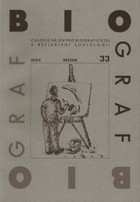
PREDA, A. (2004): Finanční vědění, dokumenty a struktury finančních činností. Biograf , (33): 3-29 - přeložili Zdeněk Konopásek a Jiřina Zachová
, (33): 3-29 - přeložili Zdeněk Konopásek a Jiřina Zachová
::::Starting from participant observation and interviews conducted in several European banks, the article examines how financial knowledge is constituted in the process of producing documents like research reports, analyses, and newsletters. The core argument is that documents act as organizational devices, with the help of which relationships are created, maintained, and managed across various contexts. In this perspective, the production of financial reports, analyses, and newsletters creates (1) knowledge-based networks of social relationships in which financial action is embedded and (2) stable temporal structures, thus ensuring the continuity of financial activities. On these grounds, the author argues here that knowledge-generating processes should be taken into account as an essential dimension of the structural embeddedness of financial action.
Přeloženo z originálu PREDA, A. (2002): Financial knowledge, documents, and the structures of financial activities. Journal of Contemporary Ethnography, 31 (4): 207-239
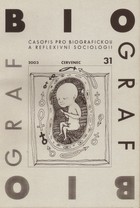
MOL, A. / LAW, J. (2003): Vtělené jednání, zjednávaná těla: příklad hypoglykémie. Biograf , (31): 5-25
, (31): 5-25
::::We all know that we have and are our bodies. But might it be possible to leave this common place? In the present article we try to do this by attending to the way we do our bodies. The site where we look for such action is that of handling the hypoglycaemias that sometimes happen to people with diabetes. In this site it appears that the body, active in measuring, feeling and countering hypoglycaemias is not a bounded whole: its boundaries leak. Bits and pieces of the outside get incorporated within the active body; while the centre of some bodily activities is beyond the skin. The body thus enacted is not self-evidently coherent either. There are tensions between the body's organs; between the control under which we put our bodies and the erratic character of their behaviour; and between the various needs and desires single bodies somehow try to combine. Thus to say that a body is a whole, or so we conclude, skips over a lot of work. One does not hang together as a matter of course: keeping oneself together is something the embodied person needs to do. The person who fails to do so dies.
MOL, A. / LAW, J. (2004): Embodied action, enacted bodies: The example of hypoglycaemia. Body & Society, 10 (2-3): 43-62
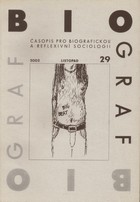
LATOUR, B. (2002): Když věci vracejí úder: Co mohou sociálním vědám přinést "vědní studia". Biograf , (29): 3-20 - přeložil Zdeněk Konopásek
, (29): 3-20 - přeložil Zdeněk Konopásek
::::The contribution of the field of science and technology studies (STS) to mainstream sociology has so far been slim because of a misunderstanding about what it means to provide a social explanation of a piece of science or of an artefact. The type of explanation possible for religion, art or popular culture no longer works in the case of hard science or technology. This does not mean, it is argued, that science and technology escapes sociological explanation, but that a deep redescription of what is a social explanation is in order. Once this misunderstanding has been clarified, it becomes interesting to measure up the challenge raised by STS to the usual epistemologies social sciences believed necessary for their undertakings. The social sciences imitate the natural sciences in a way that render them unable to profit from the type of objectivity found in the natural sciences. It is argued that by following the STS lead, social sciences may start to imitate the natural sciences in a very different fashion. Once the meanings of "social" and of "science" are reconfigured, the definition of what a "social science" is and what it can do in the political arena is considered. Again it is not by imitating the philosophers of science's ideas of what is a natural science that sociology can be made politically relevant.
LATOUR, B. (2000): When things strike back: A possible contribution of "science studies" to the social sciences. The British Journal of Sociology, 51 (1): 107-123
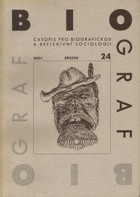
FINE, G.A. (2001): Jak se dělá příroda a ochočuje divočina: Problém "vysbírávání" lesů v houbařské kultuře. Biograf , (24): 29-56 - přeložil Zdeněk Konopásek
, (24): 29-56 - přeložil Zdeněk Konopásek
::::Although nature often has been treated as an unproblematic reality, I argue for treating it as a contested concept, suggesting that "nature" is a cultural construction. Drawing on interactionist and ecological theory, I claim that the creation of social problems involving the environment is inevitably grounded in cultural choices. Through a set of ideological structures (a protectionist vision, an organic vision, and a humanistic vision), social actors develop templates for understanding the proper relationship between humans and nature. Based on an ethnography of mushroom collecting, I contend that these models lead us to experience nature through cultural eyes - wishing to be away from civilization, to be at one with nature, and to engage in the pragmatic use of nature for personal ends. Conflicting stances toward nature account for debate over the moral acceptability of the commercial collection of mushrooms and the "problem" of overpick. Templates of human-environmental interaction, leading to models for experiencing the wild, provide the basis for understanding the conditions under which environmental change is defined as a social problem.
FINE, G.A. (1997): Naturework and the taming of the wild: The problem of "overpick" in the culture of mushroomers. Social Problems, 44 (1): 68-88
KONOPÁSEK, Z. (2000): Docela nevirtuální starosti s virtuální výukou. ComputerWorld, 11 (17): 11-12
::::
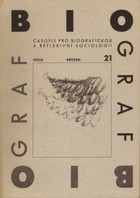
KONOPÁSEK, Z. (2000): O relativismu, biografickém výzkumu a pomocné ruce. Biograf (21): 91-100
(21): 91-100
::::
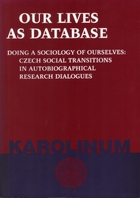
KONOPÁSEK, Z. (2000): Reflexive autobiographies: Interpreting the East - understanding the West. In: Z. Konopásek, ed.: Our lives as database: Doing a sociology of ourselves - Czech social transitions in autobiographical research dialogues. Praha: Karolinum. Str. 281-298
::::

KONOPÁSEK, Z. (2000): Grandma sociology (reconsidered). In: Z. Konopásek, ed.: Our lives as database: Doing a sociology of ourselves - Czech social transitions in autobiographical research dialogues. Praha: Karolinum. Str. 137-172
::::
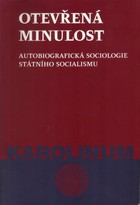
KONOPÁSEK, Z. (1999): Sociologie babičkou (po dvou letech). In: Z. Konopásek, ed.: Otevřená minulost: autobiografická sociologie státního socialismu. Praha: Karolinum. Str. 217-251
::::
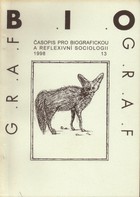
ATKINSON, P. / SILVERMAN, D. (1998): Kunderova Nesmrtelnost: Interview society a vynalézání Já. Biograf , (13): 1-25 - přeložili Lukáš Gjurič a Zdeněk Konopásek
, (13): 1-25 - přeložili Lukáš Gjurič a Zdeněk Konopásek
::::Milan Kundera[a]s novel Immortality bears a dose relation to con temporary social science debates about the production of the self. Commentators like Kleinman and Mishler seem to have introduced a new version of authenticity based on a reinvention of the Romantic subject with the interview (as the medium) and the narrative (as the content) portrayed as the means for constructing and sharing biographical experience. Unlike such contemporary Romantics, Kundera examines how the subject is constructed in literary biography and mass media "imagology". The authors show how Kundera[a]s work leads in two possible directions: an analysis of the interview society and a concern with strategies for the invention of the self. By locating styles of the self, the authors reveal lively and skillful biographical work, overlooked by cultural critique and not reducible to any structural determinism.
ATKINSON, P. / SILVERMAN, D. (1997): Kundera's Immortality: The interview society and the invention of the self, Qualitative Inquiry, 3 (3): 304-325

 ? - recenze vyjde v časopise Biograf
? - recenze vyjde v časopise Biograf
 se objevily informace o tom, co lze snad prý během března čekat v nové, sedmé verzi mého oblíbeného analytického programu
se objevily informace o tom, co lze snad prý během března čekat v nové, sedmé verzi mého oblíbeného analytického programu







